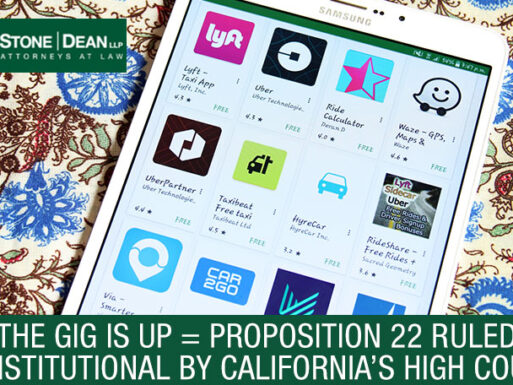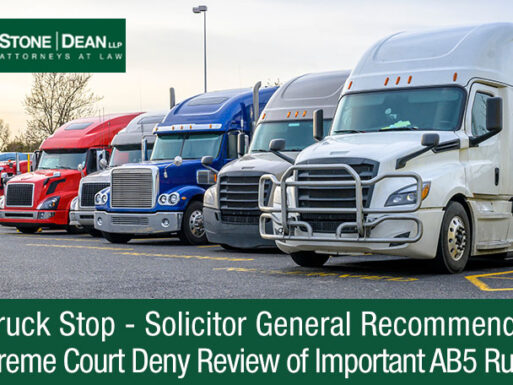Stuck in the Middle with Who?
Common carriers of household goods sometimes find themselves caught in the middle of disputes regarding the ownership of personal property being transported in interstate commerce. This article explores the statutory protections afforded to, and proper procedure to be followed by, common carriers when faced with multiple, adverse, claims to personal property being transported by the carrier in interstate commerce.
The bill of lading is the basic transportation contract between the shipper/consignor and the motor carrier, the terms and conditions of which bind the shipper and all connecting carriers. S. Pac. Transp. Co. v. Commercial Metals Co., 456 U.S. 336, 342, 102 S.Ct. 1815, 72 L.Ed.2d 114 (1982). The carrier is obligated to deliver the goods covered by the bill of lading on demand of the consignor, or the person in possession of the bill of lading. A carrier can be liable for damages to a person having title to, or right to, possession of the goods covered by the bill of lading when (1) the carrier delivers the property covered by the bill of lading to a person not entitled to their possession; (2) the carrier delivers the goods after being properly instructed not to make delivery by the consignor/holder of the bill of lading; or (3) the carrier makes a delivery of the goods despite being notified that the party receiving the goods is not authorized to take delivery.
Adverse claims of ownership to personal property arise when competing demands are made regarding property being transported in interstate commerce. Typically, these claims arise out of failed marriages, jealous beneficiaries to a will, or renters who “forgot” that the apartment that they rented as “furnished” was to be returned to the landlord that way.
The factual scenario presented in North American Van Lines, Inc., v. Bernard Heller 371 F.2d 629 (5th Cir. 1967) illustrates the dilemma faced by interstate common carriers. This matter concerned the transportation of property involved in a martial dispute. A wife who had been separated from her husband continued to live in the marital home in Louisiana. The wife surreptitiously contacted a moving company and instructed the mover to remove all furniture from the martial home and transport it to Oakland, California. The husband, upon one of his occasional visits to the home, found it vacant and stripped of all of its furnishings. The husband determined that North American Van Lines had contracted with his former wife to transport the goods in interstate commerce. Thereafter, he notified North American Van Lines and gave notice that his wife lacked the authority to order the shipment and requested that the shipment be returned.

Adverse Claims can feel like a game of Tug-of-War
What is a common carrier to do in this situation? If it completes its obligations under the bill of lading and delivers it to the party named on the contract, it faces liability for damages. Conversely, if the common carrier wrongfully refuses to deliver the property covered by the bill of lading to the consignor/holder, it also faces civil liability.
Unfortunately, in Heller, the common carrier, instead of holding the goods, or placing the goods in storage pending the carrier’s investigation of Mr. Heller’s claim, simply ignored the adverse claim and permitted the shipment to proceed to Oakland, California. The Court found that this conduct amounted to a conversion of the goods which gave rise to the right of the true owner to collect the fair market value of the goods at the time of the conversion.
The Court noted that the conversion of the goods did not occur when Mr. Heller’s goods were picked up by the carrier in Louisiana. Rather the Court found that a conversion occurred when, after the common carrier was notified that it had not right to take the property, it refused either to return it to its origin or otherwise delay the shipment pending further investigation.
In other words, the appropriate use of 49 U.S.C. 80110(d)[1] would have avoided this result.
This section provides the common carrier with an opportunity to have the validity of these completing claims investigated and, if necessary, resolved by a court of law. It provides:
(d) Adverse claims — If a person other than the consignee or the person in possession of a bill of lading claims title to or possession of goods and the common carrier knows of the claim, the carrier is not required to deliver the goods to any claimant until the carrier has had a reasonable time to decide the validity of the adverse claim or to bring a civil action to require all claimants to interplead.
In enacting this section, Congress intended to place upon an interstate common carrier the duty to act with reasonable diligence to stop an interstate shipment when information is provided to the carrier which creates the possibility that the consignor/holder of the bill of lading is not entitled to possession of the goods covered by the bill of lading. If, after conducting its own “diligent inquiry”, the carrier cannot determine the validity of the competing claims, it can the enlist the assist the Courts to resolve the controversy by filing an action in interpleader.
An action in interpleader allows the common carrier to initiate a lawsuit in order to compel the individuals making adverse claims of ownership to litigate a dispute. This allows the common carrier to step aside and have the Court determine whose interest in the subject property is superior. Once the Court rules, the common carrier simply follows the direction of the Court. An action in interpleader usually allows for the party initiating the dispute — the common carrier — to recover its attorneys fees. The action in interpleader takes the guess work out of the equation, since the Court will make the operative inquiry/determination as to who is entitled to goods.
The prudent common carrier will cease its performance under the bill of lading when a credible adverse claim is made to good being shipping in interstate commerce.
[1] The prior version of this statute was found at 49 U.S.C. Sections 89 and 90.
Gregg S. Garfinkel, partner at Stone | Dean LLP is a business litigator nationally recognized for his work in transportation, warehousing, and logistics matters. He can be reached at (818)999-2232 or ggarfinkel@stonedeanlaw.com.




